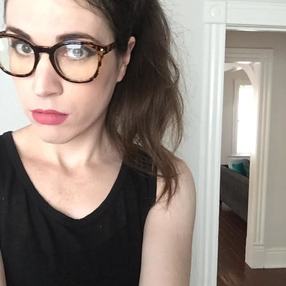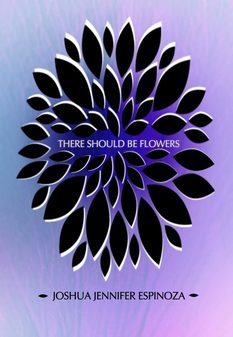Interview with Joshua Jennifer Espinoza

Up the Staircase Quarterly: There Should Be Flowers (Civil Coping Mechanisms 2016) both
seeks and is survival. It examines and is the self. The poems are flawless in their directness, and
wonderfully imperfect in their human-ness. What did you personally take away from the
experience of writing and then publishing these deeply communicative poems? How did they
come together into the format of a book? Was it a rather quick experience, or did the book
emerge over a longer period of time?
Joshua Jennifer Espinoza: The poems were written over the course of about 2 years, and in the months before beginning work on the manuscript I started looking closely at how much of what I was writing was interconnected—thematically, aesthetically, or otherwise. So, I think I was writing this particular book on some subconscious level long before I realized what I was doing, and this allowed me to craft the manuscript very easily. It took maybe six hours of editing and compiling to produce the completed text.
UtSQ: The first poem of There Should Be Flowers, “It is Important to Be Something”, begins with the line “This is like a life. This is lifelike”, which quite accurately describes the tone of many of your poems. Your lines often own a dreamy or surreal quality, but they can also abruptly drop your reader into reality. Do you consider this element of your work an actual juxtaposition of dreams and reality, or are they more of a combined idea? How do you conceptualize your work?
JJE: Going back to what I mentioned before about having an easy time putting the book together, I see myself as someone who works on a predominantly intuitive and spiritual level. I think this juxtaposition of reality and surreality comes from my attempts to recreate my subjective experience in my work—in other words, my trauma and my position in this world as a trans woman mean I am often floating between extreme dissociation and intense jolts of the harshness of reality. I write from this place without spending too much time thinking about it, because it is too painful. Instead, I let it flow out of me as kind of release.
seeks and is survival. It examines and is the self. The poems are flawless in their directness, and
wonderfully imperfect in their human-ness. What did you personally take away from the
experience of writing and then publishing these deeply communicative poems? How did they
come together into the format of a book? Was it a rather quick experience, or did the book
emerge over a longer period of time?
Joshua Jennifer Espinoza: The poems were written over the course of about 2 years, and in the months before beginning work on the manuscript I started looking closely at how much of what I was writing was interconnected—thematically, aesthetically, or otherwise. So, I think I was writing this particular book on some subconscious level long before I realized what I was doing, and this allowed me to craft the manuscript very easily. It took maybe six hours of editing and compiling to produce the completed text.
UtSQ: The first poem of There Should Be Flowers, “It is Important to Be Something”, begins with the line “This is like a life. This is lifelike”, which quite accurately describes the tone of many of your poems. Your lines often own a dreamy or surreal quality, but they can also abruptly drop your reader into reality. Do you consider this element of your work an actual juxtaposition of dreams and reality, or are they more of a combined idea? How do you conceptualize your work?
JJE: Going back to what I mentioned before about having an easy time putting the book together, I see myself as someone who works on a predominantly intuitive and spiritual level. I think this juxtaposition of reality and surreality comes from my attempts to recreate my subjective experience in my work—in other words, my trauma and my position in this world as a trans woman mean I am often floating between extreme dissociation and intense jolts of the harshness of reality. I write from this place without spending too much time thinking about it, because it is too painful. Instead, I let it flow out of me as kind of release.

UtSQ: You use storms as images and metaphors that accompany survival several times throughout There Should Be Flowers, most notably in the poem “Flowers #1”, which states “All our bodies must become storms / if we are to do more / than just survive.” What drove you to explore this compelling image in your work? What other themes felt essential to include in this collection?
JJE: Storms are a way that nature organizes itself towards some kind of destruction or creation. Storms can devastate, but they can also end droughts, or unearth things. I believe in marginalized humans organizing to destroy that which must be destroyed, and also to heal, and to discover. Most of the themes in this collection come from an attempt to both make myself and my experiences legible, and to try to extend myself into the world and connect with others like me.
UtSQ: In an interview at The Offing you are quoted as saying, “I want poetry that challenges white supremacy and poetry that challenges cis expectations to exist at the forefront. I want more poetry that fucks shit up as opposed to poetry that keeps shit in place.” Besides your own work, which has been expertly fucking shit up for a while now, who should we be reading? Which other journals, poets, writers, are fucking shit up?
JJE: Jayy Dodd, Nikki Wallschlaeger, Manuel Arturo Abreu, and Danez Smith all immediately come to mind when I think of poets whose work deserves to be read, needs to be listened to and studied and felt.
UtSQ: Now let’s jump to the beginning of your writing journey. What was your first significant literary encounter? How did this experience inspire you, or shape you, into the writer you have become?
JJE: I was in middle school the first time I read Langston Hughes and I have this specific memory of being like “Holy shit, poetry is so much more than I thought it could be”. Even more important than that, though, was how it made me realize that art is always political, always emerging from conditions it exists within—and I knew then that my investment in justice and liberation and my interest in literature could not be separated.
UtSQ: What projects are you currently working on? What’s next for you personally and/or professionally?
JJE: I’m not working on any projects in particular at the moment. I’m going on a 2 week tour of the west coast in March for Sister Spit’s 20th anniversary, but other than that I’m mostly just writing, letting each poem guide me towards the next, and doing the best I can to survive.
UtSQ: What do you find exciting, hopeful, or promising about poetry and/or the literary community right now?
JJE: I don’t know if I’m being overly hopeful, but it seems lately more people are willing to question and challenge academia’s authority over what constitutes “real” poetry and literature. Not everyone is willing or able to divest themselves from this, and I don’t hold that against individuals personally, but I’m always inspired and heartened by those who choose not to support a system that, in my opinion, kills art, destroys souls, and erases marginalized forms of knowledge while reinforcing capitalism, white supremacy, patriarchy, transphobia, etc.
UtSQ: Finally, Jen, if you could have a meal with anyone, dead or alive, real or imaginary, whom would it be, what would you talk about, and what on earth would the two of you eat?
JJE: I’d love to eat anything and talk about literally anything with Fiona Apple.
Joshua Jennifer Espinoza is a trans woman poet living in California. Her work has been featured in The Offing, PEN America, The Feminist Wire, and elsewhere. She is the author of i'm alive / it hurts / i love it (Boost House, 2014) and THERE SHOULD BE FLOWERS (Civil Coping Mechanisms, 2016).
JJE: Storms are a way that nature organizes itself towards some kind of destruction or creation. Storms can devastate, but they can also end droughts, or unearth things. I believe in marginalized humans organizing to destroy that which must be destroyed, and also to heal, and to discover. Most of the themes in this collection come from an attempt to both make myself and my experiences legible, and to try to extend myself into the world and connect with others like me.
UtSQ: In an interview at The Offing you are quoted as saying, “I want poetry that challenges white supremacy and poetry that challenges cis expectations to exist at the forefront. I want more poetry that fucks shit up as opposed to poetry that keeps shit in place.” Besides your own work, which has been expertly fucking shit up for a while now, who should we be reading? Which other journals, poets, writers, are fucking shit up?
JJE: Jayy Dodd, Nikki Wallschlaeger, Manuel Arturo Abreu, and Danez Smith all immediately come to mind when I think of poets whose work deserves to be read, needs to be listened to and studied and felt.
UtSQ: Now let’s jump to the beginning of your writing journey. What was your first significant literary encounter? How did this experience inspire you, or shape you, into the writer you have become?
JJE: I was in middle school the first time I read Langston Hughes and I have this specific memory of being like “Holy shit, poetry is so much more than I thought it could be”. Even more important than that, though, was how it made me realize that art is always political, always emerging from conditions it exists within—and I knew then that my investment in justice and liberation and my interest in literature could not be separated.
UtSQ: What projects are you currently working on? What’s next for you personally and/or professionally?
JJE: I’m not working on any projects in particular at the moment. I’m going on a 2 week tour of the west coast in March for Sister Spit’s 20th anniversary, but other than that I’m mostly just writing, letting each poem guide me towards the next, and doing the best I can to survive.
UtSQ: What do you find exciting, hopeful, or promising about poetry and/or the literary community right now?
JJE: I don’t know if I’m being overly hopeful, but it seems lately more people are willing to question and challenge academia’s authority over what constitutes “real” poetry and literature. Not everyone is willing or able to divest themselves from this, and I don’t hold that against individuals personally, but I’m always inspired and heartened by those who choose not to support a system that, in my opinion, kills art, destroys souls, and erases marginalized forms of knowledge while reinforcing capitalism, white supremacy, patriarchy, transphobia, etc.
UtSQ: Finally, Jen, if you could have a meal with anyone, dead or alive, real or imaginary, whom would it be, what would you talk about, and what on earth would the two of you eat?
JJE: I’d love to eat anything and talk about literally anything with Fiona Apple.
Joshua Jennifer Espinoza is a trans woman poet living in California. Her work has been featured in The Offing, PEN America, The Feminist Wire, and elsewhere. She is the author of i'm alive / it hurts / i love it (Boost House, 2014) and THERE SHOULD BE FLOWERS (Civil Coping Mechanisms, 2016).
